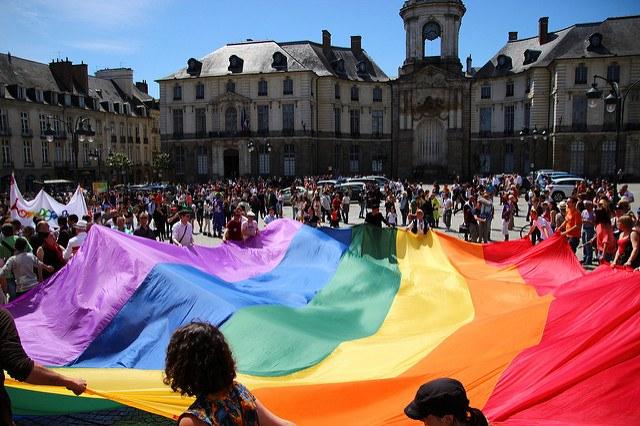
Editor's Note: A version of this post was originally posted on Medium.
By Lily Laurence
This weekend, the San Francisco Bay Area celebrated Pride, along with many around the country and world. But on the heels of a rough season of public national transphobia and the horrifying events in Orlando, I’d like to take a moment to connect the dots between queer* rights and ecological sustainability.
When we engage in ecological sustainability work, we do it for other people. One of the key reasons we have an ecological crisis today is that our economic and regulatory systems do not recognize equal value among human beings. The “others” who will be impacted by pollution and resource extraction — those in other countries, future generations or those with less money — do not count, or do not count as much.
Following, when we “other” people of diverse sexual and gender identities through ignorance, silence or malice, we are complicit in a system of hierarchy which values some people more, or more completely. Human life matters. Life matters.
Consider also the quality of life — for example, employees’ experiences at work . Forward-thinking companies are just beginning to consider this as valuable and, further, connect it to productivity (think about natural light in 'well' buildings etc). Now think about being fearful of revealing your actual identity and lived experience in your workplace — or being denied access to workplaces at all. Powerful stuff.
Society loses out by excluding people. Research also shows that diversity of perspectives makes our organizational strategies stronger (think women on the board, involving communities and supply chains in design, etc.). But we do not yet have good social norms, or an evaluative systems to include or measure diversity or quality of experience in our “growth,” “profit” or “productivity” assessments. So, social issues sometimes feel like add-ons, or “nice to haves”… (sound familiar to ecological issues?). But we know the real bottom line value is huge.
When we stand up for respect for all people, cultivate a culture of respect, and value the diversity of humanity and quality of life, we actually lay the fundamental framework needed — the emotional, social, organizational, regulatory groundwork — to create an ecologically sustainable (even regenerative) society.
Universal human rights are a foundation for ecological sustainability.
Queer allyship is active. Where in your life and work can you make a tangible, measurable difference in spaces and in people’s well-being? Try getting comfortable discussing pronouns, and use gender neutral language. Don’t assume you know “by looking” who a person is. Learn about the “I’ll go with you” project and wear a button. Encourage HR departments you know to include allyship trainings and seek out queer employment programs. Donate money to organizations doing great work. Donate time to support those organizations. Educate yourself, your kids, your friends, and family on queer history, culture, and current issues.
Thanks for taking the time to read this. I welcome thoughts and dialogue about this and your experiences connecting the dots between ecological and social justice issues.
*queer is a term my community uses as an inclusive word, but not everyone likes this term, and it has its own fraught history. Labels are tricky so the most important thing is to listen to people, be willing to use the labels they use for themselves, and be willing to evolve the labels as their/your understanding changes…. the respect matters more than the label. An inclusive (but certainly not exhaustive) acronym I know (which also doesn’t mean “the best," or “use this one”, but is useful in understanding diversity) is something like LGBTQQIP2SAA:
- Lesbian
- Gay
- Bisexual
- Trans (-gender -sexual -woman -man -folks, diverse non-binary or gender non-conforming identities)
- Two Q’s for queer and questioning;
- I for Intersex, people with two sets of genitalia or various chromosomal differences;
- P for Pansexual, people who refuse to be pinned down on the Kinsey scale;
- 2S for Two-Spirit, a tradition in many First Nations that considers sexual minorities to have both male and female spirits;
- A for Asexual, people who do not identify with any orientation; and
- A for Allies, recognizing that the community thrives best with loving supporters
- *I was inspired to write on this topic by my friend Diana Tordoff, and a message about allyship she sent to a wide group of friends. I crafted this specifically for my workplace community, REV. We help organizations develop sustainability action plans, and realize the value of embedding sustainability into organizational culture. Colleagues at REV encouraged me to take this piece public, to share and offer dialogue on this more broadly. Now, I look forward to your thoughts.
Lily Laurence is a Sustainability Coach for REV, a San Francisco-based startup that empowers organizations to embrace sustainability as a platform for innovation and value creation.
TriplePundit has published articles from over 1000 contributors. If you'd like to be a guest author, please get in touch!














